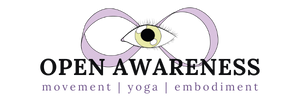
27 Sep Expression and Knowledge
Sharing your experience
Do you talk about your yoga practice to anyone else? Do you journal about it? Do you think on it?
There are a few of you that I talk with regularly about your practices, and at the end of Zoom classes we’ve started to share a bit more about what your experiences were during class.
It’s so interesting to hear how everyone heard or felt or noticed something different. It feels like the discussion itself is illuminating to the practitioner. Putting the experience into words is yet another tool for learning and growth.
Language and learning
In my neuropsychology textbook I was reading about how consciousness might be the ability to use language to express one’s experience.
Us humans have brains made with a specific capacity to use language. Not just words, but gestures and images that weave together our experiences into stories that have beginnings, middles, and ends. The capacity to form questions and initiate inquiry. The potential to share information with others. The faculty to self-narrate our lives and make meaning out of it.
Making connections
Learning is all about making connections.
Think about the way neurons work. Any one neuron has thousands of connections. When we learn, our neurons fire and create new pathways for information to travel. If some new nugget of information only has a few connections in your brain, it’s going to be hard to light up with insight. If a new nugget of information plugs into a whole network of details, memories, and knowledge you’ve already got in that big brain of yours, you’re more likely to remember it. Learning is all about making connections. It’s cool to know this because we can use it as a tool.
Connections are like the weave in a net. The more connections, the more densely woven the net. A denser net can catch on to more substance to keep. That substance is the stuff of knowledge. The more we make connections, the more we catch. The more we catch, the more we know.
Ways of knowing
In the Yoga system, there are three types of knowledge: knowledge gained by reading scripture (like the Yoga Sutras I’m always talking about), knowledge gained from logic or inference (where there’s smoke, you infer there’s fire), and knowledge gained by experience (empirical knowing, you’ve observed it with your own senses).
Yoga is a practice, it’s something you do with dedication over time. As such, the system holds knowledge gained by experience in higher esteem. Sure you can know what the philosophy says, you can have it logically understood by study and inference, but it’s all going to work out easier for you if you experience it for yourself. That is, if what you’re trying to work out is what Yoga is in the first place. We’re told it’s best to know this by experiencing it.
This brings me back around to my first question: do you talk about, or journal about, or reflect on your practice?
Getting more out of your practice
One way of getting more out of the time you spend with yourself in practice is to express it, to yourself or with someone else. By struggling to find the words to use that best reflect your experience, you fire off more neurons, make more connections, learn and know more about yourself.
You might form more nuanced questions you have about yourself. Some of these questions you may be able to answer in your experience. For some of us this might be a slight rearrangement of things. Usually I like to first know why, then try, then see for myself. Sometimes in practice I have no idea of the answer, but I try, and the experience itself reveals to me why.
The experience itself provides the knowledge.
Image by Janko Ferlic from Pexels
